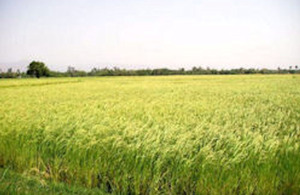DFID Research: Specialised rice developed in collaboration with local farmers
Two new rice varieties developed in India have become the first widely adopted modern varieties on India's uplands.

Ashoka rice thrives in an upland field in Jharkhand, India. Picture: Dr. Daljit Singh Virk
Rainfed upland rice farmers have little use for modern varieties bred for irrigated and fertile lowland paddies. However, two rice varieties (Ashoka 200F and Ashoka 228) developed in the early 2000s have achieved unprecedented levels of adoption in central India’s uplands. The varieties were developed by involving farmers in establishing breeding priorities, known as client-oriented breeding (COB), and by involving them in selecting processes, known as participatory varietal selection (PVS). These farmer-oriented breeding approaches offer dual benefits as they reduce breeding time, and produce varieties in response to farmers’ articulated needs. The result has been to provide valued flavour and cooking characteristics, early maturity, drought tolerance and improved yield in these two varieties of rice.
A recent impact assessment conducted under DFID’s Research Into Use (RIU) programme has revealed that 95% of farmers who received seed in the five release states continued to grow the varieties 4 to 6 years later from their own saved seed. High adoption levels in project villages were matched by those in neighbouring villages indicating that rice had spread informally from farmer to farmer. Some 400,000 hectares of Ashoka rice is estimated to be grown by nearly 3 million households across central India.
The development and dissemination of the Ashoka varieties was made possible primarily by financial and in-kind contributions made by DFID bilateral development projects, and subsequently by supplementary funding by DFID’s Plant Sciences Research Programme.
Read the full version of this case study, Ashoka rice: selecting for success with farmer participation.
Key reference
Conroy, C., J.R. Witcombe, D.S. Virk, M. Basu, M. Buchy and A. Dey, (2009) New Upland Rice Varieties for India. Rainfed Agriculture Impact Study No. 1. Monitoring Impact Assessment and Learning Component (MIL) 2.2 of the Research into Use Programme (RIU), DFID